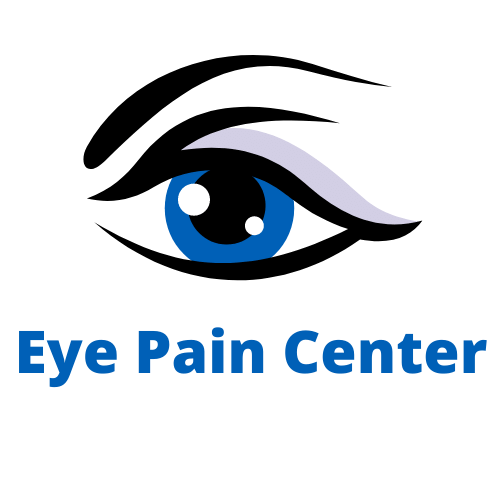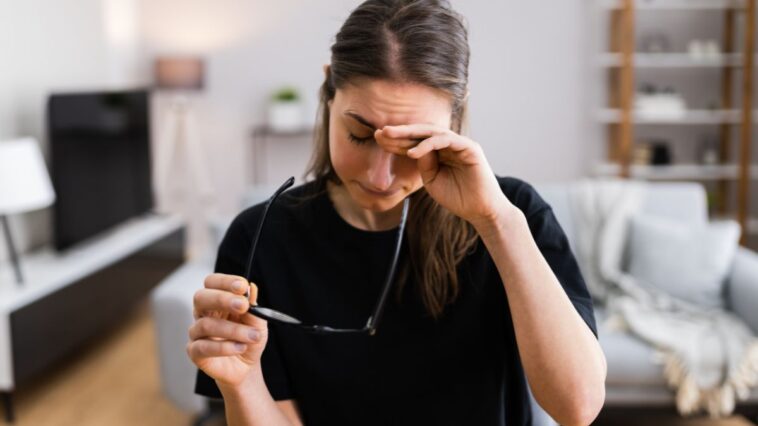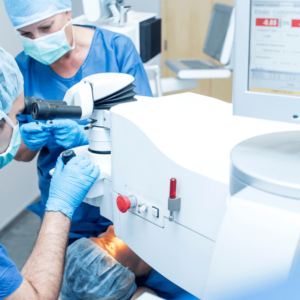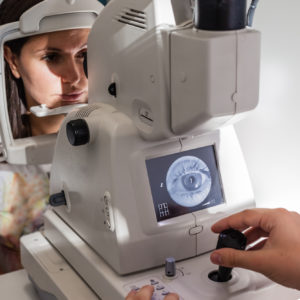Dry eyes at night is a condition in which a person experiences discomfort, irritation, and a sensation of dryness in their eyes during the nighttime. This can lead to difficulty sleeping and cause various other issues, such as redness, sensitivity to light, and blurry vision.
What Happens to Your Eyes When you Sleep?
When you sleep, your eyes go through several physiological changes. Here are some of the things that happen to your eyes when you sleep:
- Reduced blinking: When you’re sleeping, blinking happens much less often than when you’re awake. This can make your eyes feel dry and uncomfortable due to a lack of lubrication from natural tears. Reduced blinking is a common problem for those with long hours on the computer or staring at screens and those with certain medical conditions.
- Eye relaxation: When we go to sleep, our eye muscles relax, which can cause our eyes to become misaligned. This can explain why some people experience blurry vision temporarily when they wake up. Relaxing the eye muscles is a crucial part of getting enough restful sleep.
- Increase in tear production: During sleep, increased tear production occurs because your eyes produce more tears than when awake. This helps to keep the delicate eye area moist and prevents any discomfort from dryness.
- Change in pupil size: Pupil size can change during sleep, often resulting in comparatively smaller pupils. This decrease in the size of pupils reduces the amount of light entering the eyes.
- Rapid Eye Movement (REM): During Rapid Eye Movement sleep, you experience periods of intense brain activity while your eyes dart back and forth rapidly beneath the eyelids. This stage of sleep is when we dream, and scientific research suggests that this eye movement helps to keep our eyes healthy by providing them with exercise and nutrients via oxygen.
When you sleep, your eyes undergo several changes that help to protect and rejuvenate them and ensure that they are ready for another day of use when you wake up.
What Causes Dry Eyes at Night?
There are several possible causes of waking up with dry eyes, including:
- Reduced blinking: While you sleep, you blink less frequently, which can cause your eyes to dry out.
- Low humidity: Low humidity in a bedroom can cause dryness, particularly during the winter when indoor heating systems can make the air even drier. Without adequate moisture in the air, your eyes may begin to feel dry and irritated.
- Sleep position: Sleeping position can affect how much moisture your eyes have. If you are sleeping face down on a pillow or in any other way that restricts the flow of tears, this can lead to dry eye. Make sure to adjust your position while sleeping so that you aren’t blocking the tear ducts and causing your eyes to get too dry.
- Allergies: Allergies can cause dry eyes. Allergic reactions to substances in your bedding or bedroom environment may result in dry eye symptoms. If you suspect this is the case, it is best to consult with an allergist and look for ways to reduce allergen exposure, eliminate triggers and get treatment.
- Contact lenses: Contact lenses are a great way to enhance your vision. However, it is essential to remember that cleaning them properly and sleeping with them on them can prevent dryness. That’s why it’s essential to thoroughly clean your lenses and remove them before you go to bed!
- Aging: Our tear production may decrease, leading to dry eyes. This is a common symptom of the natural aging process.
- Certain medications: Certain medications can have the unwanted effect of causing dry eyes. If you take any medication and experience uncomfortable dry eye symptoms, speak with a doctor.
- Underlying medical conditions: Individuals who suffer from medical conditions such as Sjogren’s syndrome, rheumatoid arthritis, or thyroid problems are at an increased risk of dry eye symptoms. These conditions can cause changes to the tear film that lead to dryness.
If you experience persistent dryness or discomfort in your eyes upon waking up, it is best to consult an eye doctor for an evaluation and proper diagnosis.
What Are the Symptoms of Dry Eyes at Night?
Dry eyes at night can cause a variety of uncomfortable symptoms, including:
- Eye redness
- Blurred vision
- Burning or stinging sensation in the eyes
- Itching or scratchiness in the eyes
- Sensitivity to light
- Eye fatigue or strain
- Feeling like there is something in your eye
- Difficulty wearing contact lenses
- Excessive tearing or watering of the eyes
- Discomfort or pain in the eyes
These symptoms may also be indicative of other eye conditions. Hence, it’s always a good idea to consult an eye doctor for an accurate diagnosis and treatment plan.
How Can I Treat Dry Eyes At Night?
There are several treatments available for dry eyes at night, including:
- Use a humidifier: Adding moisture to the air can help keep your eyes from drying out, especially during dry winter.
- Apply warm compresses: Applying a warm, damp compress to your closed eyes for a few minutes can help loosen up any oil buildup that can block your tear ducts and cause dryness.
- Use artificial tears: Over-the-counter artificial tears are a common and effective way to lubricate your eyes and reduce dryness. Look for preservative-free options if you have sensitive eyes.
- Avoid irritants: If you’re experiencing dry eyes, it’s essential to avoid anything that can exacerbate your symptoms, such as smoke, wind, or harsh chemicals.
- Adjust your sleep environment: Avoid sleeping directly under a fan or air conditioning unit, which can cause dry air to circulate you while you sleep.
- Consider prescription medication: If over-the-counter remedies aren’t working, your eye doctor may prescribe a medication to help increase tear production.
You must talk to your eye doctor about your specific symptoms to determine the best treatment. They may recommend a combination of treatments to provide the most relief.
How to Prevent Dry Eyes at Night?
Here are some tips that may help prevent dry eyes at night:
- Use a humidifier: Running a humidifier in your bedroom can help keep the air moist, reducing the chances of your eyes drying out while you sleep.
- Avoid sleeping under a ceiling fan or air conditioning vent: This can cause dry air to blow directly on your face, which can dry out your eyes and exacerbate dry eye symptoms.
- Apply warm compresses: Applying a warm, damp compress to your closed eyes before bed can help loosen any oil buildup and open your tear ducts, allowing your eyes to stay lubricated throughout the night.
- Blink regularly: Be mindful of your blinking patterns and try to blink regularly throughout the day and before bed. This can help distribute your natural tears and keep your eyes moist.
- Follow good sleep hygiene: Maintaining good sleep hygiene, such as avoiding screens for at least an hour before bed, keeping a consistent sleep schedule, and creating a comfortable sleep environment, can help reduce stress and promote healthy sleep.
- Consult your eye doctor about side effects: Certain medications, such as antihistamines or decongestants, can cause dry eyes. Talk to your healthcare professional about alternatives if you’re taking any medication and experiencing dry eyes.
- Wear an eye mask or goggles: Wearing an eye mask or goggles to bed can help protect your eyes from dry air and other irritants.
Suppose you experience persistent or severe dry eye symptoms at night. In that case, you must consult an eye doctor to identify the underlying cause and determine the best treatment for you.
What Foods Should I Avoid to Reduce Dry Eye Symptoms?
No specific food has been proven to cause dry eye symptoms, but certain dietary habits or substances can exacerbate the symptoms. Maintaining a balanced diet and staying hydrated is vital to ensure eye health.
Here are some foods and substances you may want to avoid or limit to help reduce dry eye symptoms:
- Alcohol: Alcohol can also cause dehydration, so it’s best to avoid it or consume it in moderation.
- Caffeine: Caffeine can dehydrate your body, including your eyes, so you should limit your consumption of coffee, tea, and soda.
- Omega-6 fatty acids: A diet high in omega-6 fatty acids (found in vegetable oils, processed foods, and some meats) may increase inflammation, which can worsen dry eye symptoms.
- Fried foods: High-fat foods, particularly fried ones, can cause inflammation and contribute to dry eye symptoms.
- Processed foods: Processed foods can contain additives and preservatives that may worsen inflammation and exacerbate dry eye symptoms.
- Sugary foods: A diet high in sugar can lead to inflammation and contribute to dehydration, which can worsen dry eye symptoms.
Maintaining a balanced diet that includes plenty of fruits, vegetables, whole grains, lean protein, and healthy fats is essential.
Drinking plenty of water and staying hydrated are also crucial for eye health. Consult with a healthcare professional or registered dietitian for individualized nutrition advice.
When Should I See a Doctor For Dry Eye Symptoms?
Experience mild, occasional dry eye symptoms, such as redness, itching, or a gritty sensation. You can manage the symptoms with over-the-counter eye drops or other home remedies. However, if your symptoms persist or worsen, you should consider seeing a doctor.
Here are some signs that indicate it may be time to see a doctor for dry eye symptoms:
- Severe or persistent symptoms: If your dry eye symptoms are severe or persistent, it’s essential to consult an eye doctor. They can help diagnose the underlying cause of your symptoms and recommend the appropriate treatment.
- Eye pain or vision changes: If you experience eye pain or sudden changes in your vision, you should seek medical attention immediately. These symptoms could indicate a more serious eye condition.
- Discharge or crusting of the eye: If you notice discharge or crusting around your eyes, it may indicate an infection. It’s essential to see a doctor for diagnosis and treatment.
- Sensitivity to light: If you experience sensitivity to light, it may be a sign of a more serious eye condition, such as an infection or inflammation.
- Difficulty performing daily activities: If your dry eye symptoms interfere with your ability to perform daily activities, such as reading or driving, it’s essential to seek medical attention.
An eye doctor can help diagnose the underlying cause of your dry eye symptoms and recommend appropriate treatment, including prescription eye drops, medications, or other interventions.
Conclusion
Dry eyes at night can be frustrating and uncomfortable, disrupting your sleep and daily life. However, several strategies can help manage and prevent dry eyes at night, such as using a humidifier, applying warm compresses, and avoiding environmental irritants.
Taking proactive steps to manage and prevent dry eyes at night can improve your eye health, quality of sleep, and overall well-being. In addition, it’s essential to practice good sleep hygiene, such as avoiding screens before bed and creating a comfortable sleep environment.
If your dry eye symptoms persist or worsen, you must consult an eye doctor to identify the underlying cause and recommend the appropriate treatment.






